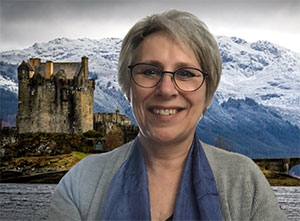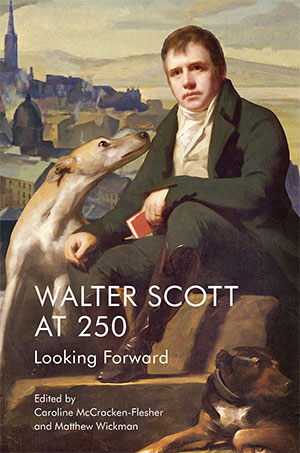
Contact Us
Institutional Communications
Bureau of Mines Building, Room 137
Laramie, WY 82071
Phone: (307) 766-2929
Email: cbaldwin@uwyo.edu

UW Professor Collaborates on Book Noting Sir Walter Scotts 250th Anniversary
Published March 01, 2021

Caroline McCracken-Flesher, a UW English professor and director of the Center for
Global Studies, co-edited a new book, titled “Walter Scott at 250: Looking Forward.”
The book considers the ways in which Scott’s work resonates today. (Caroline McCracken-Flesher
Photo)
Ten years ago, the University of Wyoming hosted the ninth International Conference on Sir Walter Scott, marking only the third time the international conference had been held in North America. Participants came from Australia, France, Scotland, England, Germany and Hong Kong.
Born of that conference is a new book, titled “Walter Scott at 250: Looking Forward” and edited by Caroline McCracken-Flesher, a UW English professor and director of the Center for Global Studies; and Matthew Wickman, a Brigham Young University (BYU) English professor and founding director of the BYU Humanities Center. Eight of their colleagues contributed writings for the book.
“That conference was the genesis of this book, for situating it in Wyoming put Scott not just in a new landscape, but in a new imaginative context,” McCracken-Flesher says. “As we began to think about Scott’s resonance in distant places and in our time, suddenly, he became much more modern and relevant.”
This year marks the 250th anniversary of Scott’s birth in Edinburgh, Scotland. Many of Scott’s works remain classics of both English-language literature and Scottish literature, such as the narrative poem “The Lady of the Lake” and his classic novels “The Tale of Old Mortality,” “Rob Roy” and “Ivanhoe.”
“On Scott’s 250th birthday, it’s particularly meaningful to consider the ways in which his work resonates for us today,” McCracken-Flesher says. “Scott is best known for his ability to register the human complexity of historic moments.”

In “Walter Scott at 250: Looking Forward,” the 10 original essays revisit Scott as a “theorist of tomorrow, as the surveyor of the complexities of the present who also gazes, as we do, toward an anxious and hopeful future,” according to the book’s preface.
During Scott’s time, there was upheaval: France slipped into revolution; Napoleon threatened order in neighboring Britain; science leaped ahead; landscapes shifted with industry; peoples swirled around new cities; and party politics ran rampant.
“All of this makes Scott an author for today,” McCracken-Flesher says. “Scott struggled to engage the challenge to landscape and memory posed by industrial change, as do we; his characters feel the pull of family and tradition against modernity and contingency, as do we.”
The book’s contributors focus on Scott’s sense of the change in time -- things are speeded up, interrupted, already past the point of return -- and, yet, likely to change again, the authors say. They consider his commitment to productivity on an almost industrial scale, alongside that of Napoleon. They ponder his relation to human ecologies, and they think about how his writing ran alongside the gender politics of his time.
McCracken-Flesher has written extensively on Scottish literature and culture, including science fiction, nationalism and authors Scott and Robert Louis Stevenson. She grew up in Northern Ireland and earned her first degree at the University of Edinburgh. Her work on Scotland began at Brown University in Providence, R.I., where she began to register the similarities between Calvinist cultures and their literatures, even when divided by the Atlantic.
“My work on Scott, though, may have begun one rainy summer in the Scottish Borders, when I was an undergraduate,” she says. “My parents thought we should visit Scott’s house. So, I bought my first Scott novel at Scott’s house, and I have never stopped reading him.”
Her previous books include “Possible Scotlands: Walter Scott and the Story of Tomorrow”; “The Doctor Dissected: A Cultural Autopsy of the Burke and Hare Murders”; “Scotland as Science Fiction”; and “Culture, Nation and the New Scottish Parliament.” Her edition of Stevenson’s “Kidnapped” is forthcoming.
McCracken-Flesher directs the UW in Scotland program, which works to convert faculty expertise, experience and connections into opportunities for UW students.
For more information, email McCracken-Flesher at cmf@uwyo.edu.
Contact Us
Institutional Communications
Bureau of Mines Building, Room 137
Laramie, WY 82071
Phone: (307) 766-2929
Email: cbaldwin@uwyo.edu

